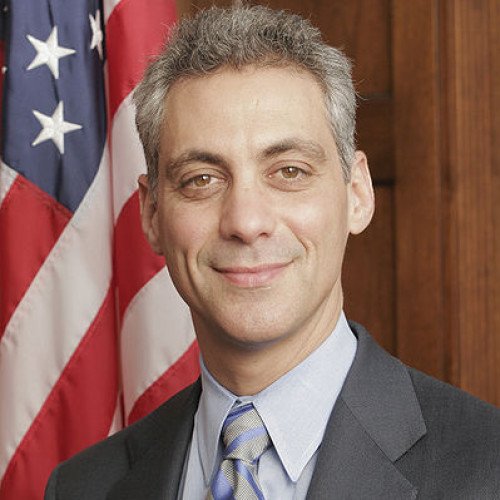Barry Goldwater VS Rahm Emanuel

Barry Goldwater
Barry Morris Goldwater (January 2, 1909 – May 29, 1998) was an American politician, businessman, and author who was a five-term Senator from Arizona (1953–1965, 1969–1987) and the Republican Party nominee for president of the United States in 1964. Despite his loss of the 1964 presidential election in a landslide, Goldwater is the politician most often credited with having sparked the resurgence of the American conservative political movement in the 1960s. He also had a substantial impact on the libertarian movement.Goldwater rejected the legacy of the New Deal and, along with the conservative coalition, fought against the New Deal coalition. A member of the NAACP and active supporter of desegregation in Phoenix, Goldwater voted in favor of the Civil Rights Act of 1957 and the 24th Amendment to the U.S. Constitution, but opposed the Civil Rights Act of 1964, believing it to be an overreach by the federal government—a decision that considerably anguished him. In 1964, Goldwater mobilized a large conservative constituency to win the hard-fought Republican presidential primaries. Although raised as an Episcopalian, Goldwater was the first candidate of ethnically Jewish heritage to be nominated for President by a major American party (his father was Jewish). Goldwater's platform ultimately failed to gain the support of the electorate and he lost the 1964 presidential election to incumbent Democrat Lyndon B. Johnson by one of the largest margins in history. Goldwater returned to the Senate in 1969 and specialized in defense and foreign policy. As an elder statesman of the party, Goldwater successfully urged President Richard Nixon to resign in 1974 when evidence of a cover-up in the Watergate scandal became overwhelming and impeachment was imminent. Goldwater narrowly won re-election in 1980 for what would be his final and most influential term in the senate. In 1986, Goldwater oversaw passage of the Goldwater–Nichols Act, arguably his most significant legislative achievement, which strengthened civilian authority in the Department of Defense. The following year, he retired from the Senate and was succeeded by John McCain, who praised his predecessor as the man who "transformed the Republican Party from an Eastern elitist organization to the breeding ground for the election of Ronald Reagan". Goldwater strongly supported the 1980 presidential campaign of Reagan, who had become the standard-bearer of the conservative movement after his "A Time for Choosing" speech. Reagan reflected many of the principles of Goldwater's earlier run in his campaign. The Washington Post columnist George Will took note of this, writing: "We [...] who voted for him in 1964 believe he won, it just took 16 years to count the votes". Goldwater's views grew increasingly libertarian as he neared the end of his career. After leaving the Senate, Goldwater's views cemented as libertarian. He criticized the "moneymaking ventures by fellows like Pat Robertson and others [in the Republican Party] who are trying to... make a religious organization out of it." He lobbied for homosexuals to be able to serve openly in the military, opposed the Clinton administration's plan for health care reform, supported abortion rights, and the legalization of medicinal marijuana.
Statistics for this Xoptio

Rahm Emanuel
Rahm Israel Emanuel (; born November 29, 1959) is an American politician who served as the 55th mayor of Chicago from 2011 to 2019. A member of the Democratic Party, he previously served as the 23rd White House Chief of Staff from 2009 to 2010, and as a member of the United States House of Representatives from Chicago between 2003 and 2009. Born in Chicago, Emanuel is a graduate of Sarah Lawrence College and Northwestern University. Working early in his career in Democratic politics, Emanuel was appointed as director of the finance committee for Bill Clinton's 1992 presidential campaign. In 1993, he joined the Clinton administration, where he served as the assistant to the president for political affairs and as the Senior Advisor to the President for policy and strategy. Beginning a career in finance, Emanuel worked at the investment bank Wasserstein Perella & Co. from 1998 for 2½ years, and served on the board of directors of Freddie Mac. In 2002, Emanuel ran for the seat in the U.S. House of Representatives vacated by Rod Blagojevich, who resigned to become governor of Illinois. Emanuel won the first of three terms representing Illinois's 5th congressional district, a seat he held from 2003 to 2009. As the chair of the Democratic Congressional Campaign Committee, he oversaw Democratic wins in the 2006 United States House of Representatives elections, allowing the party to gain control of the chamber for the first time since 1994. After the 2008 presidential election, President Barack Obama appointed Emanuel to serve as White House chief of staff. In October 2010, Emanuel resigned as chief of staff to run as a candidate in Chicago's 2011 mayoral election. Emanuel won with 55% of the vote over five other candidates in the non-partisan mayoral election, succeeding 22-year incumbent Richard M. Daley. At his reelection, although Emanuel failed to obtain an absolute majority in the February 2015 mayoral election, he defeated Cook County board commissioner (and later U.S. Representative) Jesús "Chuy" García in the subsequent run-off election in April. In late 2015, Emanuel's approval rating plunged to "the low 20s" in response to a series of scandals. These followed and were attributed to the police shooting of 17-year-old Laquan McDonald, the city's subsequent attempts to withhold a video of the shooting, and the lack of an investigation into the matter. Emanuel initially announced in October 2017 he planned to run for a third term, but on September 4, 2018, he reversed his decision and announced that he would not seek a third term due to personal obligations. The Chicago Tribune assessed Emanuel's performance as mayor as "mixed." At one point, half of Chicagoans favored Emanuel's resignation. He later made steady progress in recovering his political support. He left office in May 2019 and was succeeded by Lori Lightfoot.